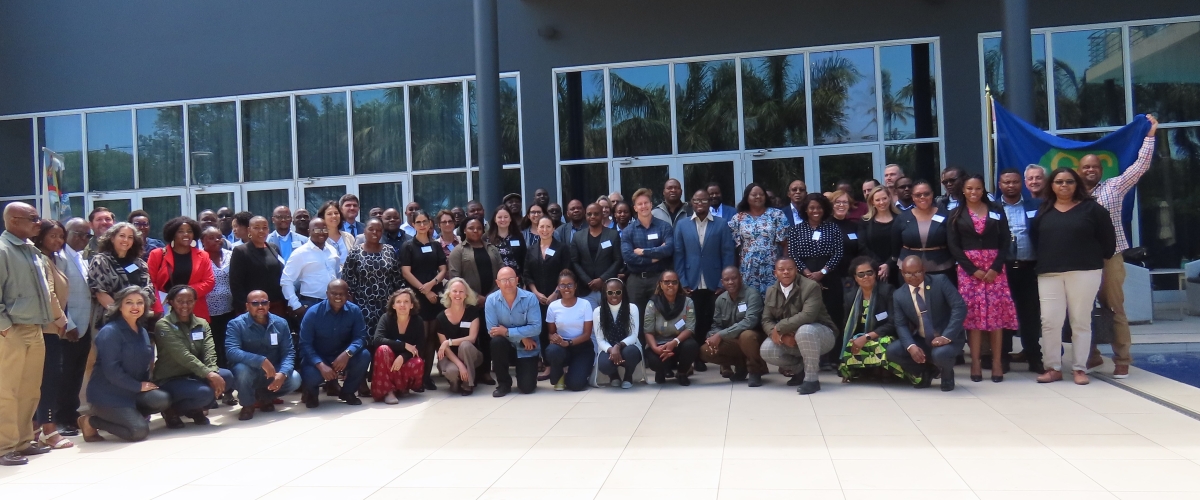
Maputo, Mozambique - In a significant stride towards sustainable development, the Centre for Coordination for Agriculture Research and Development in Southern Africa (CCARDESA) participated in the Southern African Development Community (SADC) Transfrontier Conservation Areas (TFCA) Annual Meeting held at the Raddison Blu in Maputo, Mozambique. CCARDESA represented by the Board Member responsible for the environment, Dr Diana Earnshaw, and Mrs Bridget Kakuwa-Kasongamulilo the ICKM officer attended this meeting.
This crucial gathering, concerned with the advancement of TFCAs, was a collaboration between the SADC Secretariat, the Government of Mozambique, the SADC/GIZ Climate Resilience and Natural Resources Programme (C-NRM), USAID through the WWF Khetha Programme, and MOZBIO.
Highlighting the meeting's importance, Mr. Domingos Gove, the SADC Director for Food Agriculture and Natural Resources (FANR), applauded the TFCA Community of Practice for developing a robust TFCA program and urged for continued progress while considering the livelihood needs of surrounding communities.
Angola being the Current SADC Chair through Ms. Joyce Maria, said “25% of Mozambique consists TFCAs’. TFCAs are founded with the aim of collaboratively managing shared natural and cultural resources across international boundaries for improved biodiversity conservation and socio-economic development” " she said. She also applauded the approval of the new TFCA program for 2023-2024, which includes strategies for forestry, resource mobilization, and the overall value of TFCAs.
Furthermore, the meeting addressed the critical goals of reducing wildlife crime and strengthening national wildlife prosecution strategies. The SADC Forestry Strategy 2023-2040 was approved, urging member states to sustainably manage their forestry resources. This strategy encompasses forestry institutional capacity, financial investment, human capacity, forestry products, and a revised Monitoring and evaluation Framework.
Ms Candice Stevens from the Sustainable Finance Coalition highlighted the importance of designing and mobilizing sustainable finance for TFCAs, addressing the need for biodiversity finance. The meeting also covered opportunities for EU funding, co-financed by the German government through GIZ.
Ms. Naambo Lipinge, Deputy Director for Etosha National Park, and former TFCA Coordinator for Namibia, Ministry of Environment, Forestry and Tourism from Namibia raised critical inquiries about member states' roles in propelling the TFCA agenda. “Why do TFCAs remain at the conceptual level? Why are we stagnant? How do we help ourselves? What should we do as member states to ensure that we start running? How can we take the lead and ensure that we become relevant”? Probed Ms. Naambo
Ms. Bridget Kakuwa-Kasongamulilo presented CCARDESA's role in TFCAs, emphasizing their work in sensitizing the media and disseminating information across member states.
The SADC TFCA Coordinator, Steve Collins, acknowledged the 10th anniversary of the SADC TFCA, stressing the collaborative efforts of government organizations, development partners, and community-based organizations. He emphasized the importance of intersectional work for success.
This meeting also celebrated the approval of the 10-year strategy, focusing on information sharing, knowledge management, and learning. Discussions included the categorization of TFCAs, with a special focus on those under category C, considered to be stagnant. Strategies for accelerating development, including the creation of a toolbox, were discussed
A notable quote from the meeting was, “Communities on both sides of the TFCAs can have harmonized by-laws to better suit and meet their needs.” This statement underscores the importance of community involvement in conservation efforts.
The meeting concluded with acknowledgments from Ms. Ndapanda Kanime -Senior TFCA Advisor at the SADC Secretariat, who thanked various contributors and emphasized the collective effort needed for the successful implementation of the TFCA program.
This annual meeting marks a pivotal moment in regional cooperation and sustainable development, setting the stage for enhanced conservation efforts and community engagement across the SADC region.





